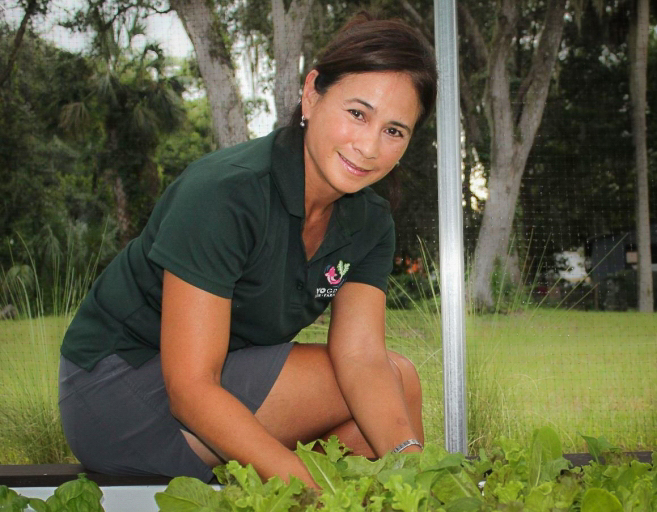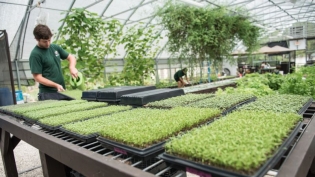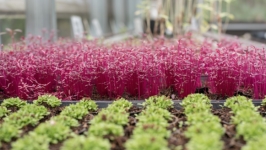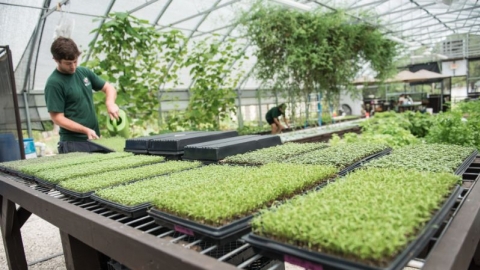Helga Tan Fellows on Aquaponics and Sustainable Farming
Until she started GYO GREENS, Helga Tan Fellows had no idea how difficult farming would be as a career and as a business. She is passionate about supporting the talented farmers in our region, and has the utmost respect for farmers everywhere because, as she states, "we need a farmer three times a day!" In her new career, Helga is proud to be called "Chief Farming Officer", and she gladly plays the role of mentor, educator and advocate for the importance of farming.
GYO GREENS is an aquaponics farm in Palm Valley/Ponte Vedra -- and it seems you focus a good deal of energy on educational outreach. How did this come to be a priority? Was it always the goal of the greenhouse to serve this function, in part?
Yes education was one, if not, the main reason why GYO GREENS started aside from the fact that I always wanted a private garden. My parents were University professors so education is in my DNA. I ended up as an Engineer which took me down a few different paths but I always had a strong desire to teach and in an area that I was passionate about.
We’ve had over 500 students visit since we started and I am thrilled about that number, particularly since I convinced my husband to make this investment based on the line “build it and they will come.” And of course I had no idea if that would be the case, which is an uncomfortable position for an engineer. We’ve had students all the way from Kindergarten to graduate University students. All levels including special needs. Some just visit for field trips particularly younger groups. Middle school and high school students visit to work on their science projects or volunteer hours. University students volunteer for us too. The University students that volunteer often become our paid Interns. We had a fantastic group of students from both UNF and JU helped us grow the farm.
It is important to clarify that we are NOT an aquaponics training facility. There many other facilities that specialize in this kind of training. Our education goals are focused on learning about sustainable farming and nutrition and healthy eating, not just the process of aquaponics. We want the schools and universities to take advantage and use our farm as an extension of their science curriculum. We do offer private tours for people interested in learning more about Aquaponics but once they want to implement a system, we refer them to other training facilities. We want to spread the word about sustainable farming practices not just how to build a aquaponics farm. We have allowed though individuals at our farm to learn about commercial aquaponics. Currently, we have a young woman who is an accomplished trained chef working as a volunteer at GYO GREENS. She offers her advice on crops and taste and helps us with volunteering work. We provide the hands on experience in exchange of work. We can’t wait to see how she does when she starts her own farm.
We are not only about education, we are very much driven by selling our specialty produce. We must grow to teach and we must sell to stay in business. It is a very simple equation. Keeps all of us motivated and focused on our goal.
My passions have always been travel, education and gardening. I spent over seven years living outside the US in Hong Kong, Japan and London. I experienced the rich cultural diversity of Asia and Europe. I grew up in Puerto Rico where we have some amazing and beautiful tropical plants. While living in London, I was a volunteer at the Royal Botanical Gardens in Kew which further piqued my interest in gardening. I had the opportunity to visit many different gardens and gather a lot of ideas for potential designs.
I am also a big advocate of sustainable and renewable energy practices. This is how Aquaponics became a real possibility. I could build my garden using sustainable practices. I was searching for a means to enjoy gardening, promote environmental sustainable practices and provide a vehicle for education. Aquaponics was the perfect intersection of all those passions and GYO GREENS was the result.
Why did you choose to establish your farm in NE Florida? Are you from the region? Or, do you have roots here?
I’ve lived in the area for the last 10 years and I can call it home. I decided to establish the farm in Ponte Vedra because it was close to home. Believe me, convincing my husband to buy farm land near the beach required my best selling skills. The nice surprise is that Palm Valley is a very special area. It has a beautiful history and the community has been incredibly supportive since the first day I started. I knew I was in good shape when very early on after clearing the land one of the first visitors was Syd Mickler who said “I don’t care what you do with this property just don’t disturb this persimmon tree and all will be fine.” Needless to say, we still keep and pamper that persimmon tree. I also have to thank a neighbor, Tab Baer, for giving me the encouragement to go ahead when I was ready to give up. After many trips to the St. Johns county offices and lots of explaining what Aquaponics was I managed to finally get approval and great support from their staff.
I did not want a small backyard garden. I have had that before. I wanted a large size garden where I could enjoy growing many different plants (both edible and ornamental, particularly orchids) and learn a lot about the growing process. A place where I could go every day and relax and enjoy taking care of the plants. Perhaps a hobby to do for retirement time. Of course, ultimately my goal was to enjoy eating all this produce at home and use the ornamental plants to decorate my house. All this made the entire project more complicated. Then, knowing that I wanted to make it an education center, I had to build the structure suitable for this goal.
However, it was the community that built the place. I like to believe the community there really wanted a place like this. The farm was built by contractors in the neighborhood who took the job(s) and managed the project while doing their daily jobs and other projects near by. They would stop by the farm to check on the progress upon their return from work or on their way to their projects. The community center across the street from us supports us (almost weekly) with the school visits. We can host the school buses there and welcome the students. The community center has opened a weekly market where they bring and sell local produce every Tuesday. Of course, we sell our produce too. It is great to see how the support for this market keeps growing.
What's your background? How did you learn about aquaponics?
My formal training is in Industrial Engineering with a master in business administration and a minor in information technology. I spent 20+ years in the manufacturing of both ophthalmic and medical device products. Then I moved on to the implementation of manufacturing business software.
I learned Aquaponics initially with Morning Star Fishermen and also Pentair Aquatics. However, we are constantly learning about both Aquaponics and farming. We are fortunate to have four of the top experts in the field (two from Florida and two outside of the US) auditing and working with us to keep our systems in the best condition to produce outstanding specialty produce.
You've spent a good deal of time outside the country learning about processes and techniques for urban growing lately. Can you tell us a bit more about the experience? What you're learning and what you think you might bring back?
It is fascinating to witness all the techniques in Urban growing around the world. As you know, I spend a large amount of my time in London. While it keeps me away from the daily tasks of my farm I am constantly online with my team in Ponte Vedra. And the upside is, I have the opportunity to volunteer at an Aquaponics place here right in the middle of the London. They have been producing beautiful produce all winter! How neat is that! You get to taste locally and naturally grown beautiful greens all winter. Grown right in your backyard!
Also, there is another small Aquaponics system placed next to a few restaurants where they grow produce, harvest it and use it right away. All part of the same project. They were originally started by a crowdfunding campaign. They are now supported by one of the biggest local utilities company. It is also great to learn what other fellow Aquaponians are doing particularly outside the US. Two of our regular consultants live outside the US, one in Australia and one in Thailand. We are always gaining new insights from them.
I do hope to create the awareness that there are many techniques out there that we could implement. This could be an opportunity perhaps for buildings that have been abandoned and not in use. We have farmers already in the area and beyond growing indoors and using Aquaponics and other similar growing techniques. I believe what I can bring back is the message that we must invest in good produce and eating healthy food. I I truly believe in prevention and healthy eating habits.
What's the most challenging part of farming small in Northeast Florida?
We grow with the seasons and we do not control our weather. Therefore, our product is seasonal. While that is part of the “charm,” the selection is limited particularly in the Summer. The weather could turn on us rapidly. So we are constantly guessing and adjusting our schedule based on weather. Keeps us challenged for sure. We are learning a lot though from local farmers who has been in the industry for family generations. They are always willing to teach us. We are fortunate to work with such talented individuals.
We talk a lot about seasonal ingredients and consumers, chefs, restaurants, artisans and farms working together as a "food system." What are some of the hurdles you face in trying to get your product to market?
I think initially you have to prove yourself as a farmer and your commitment and of course been able to deliver consistent high quality produce. We spent over a year doing research and making sure our system was ready for commercial product. We had plenty of greens but I resisted the urge to sell until I knew we had a validated system with high quality produce. We also had to ensure we had all the good agricultural practice procedures in place. It is a big responsibility when you are growing food even as small as our operations. Growing the produce is great fun and very rewarding but at the end of the day you are running a business. So we had to learn many areas we were not familiar with. Particularly areas in the logistics department like who to contact, invoicing, deliveries, customer service, etc.
However, I can tell you that without a "food system” in place we would have not been able to continue with GYO GREENS plans. We work together with our customers to determine our seeding schedule. Our chefs and restaurant owners provide ideas and items they need for either their regular menus or private events. We are a small farm so we only grow specialty produce and in small quantities. We leave the big production of items to our colleagues with larger farms and systems and experience. We also like to try new items and our customers decide if it is a good crop or not. The GYO staff loves to cook recipes with our produce. So we are all always comparing notes. My travel allows me to send ideas for both growing and also for the chefs to try in their menus. It is a great working relationship.
Before I started the farm, I sat with a chef/customer located near our farm. This chef was incredibly supportive listening to my “idea.” Whether he believed or not that we could actually build the farm, he was kind enough to take the time and provide ideas. Our first official customer taught us about invoicing, delivering and some logistics and even how to position our farm. We still have their first invoice and pay check. It was invoice #1 and the first official payment we received. We continue to do business with them and they have sent us more customers.
Our customers helps us grow. They are also incredibly understanding if we have any delays in deliveries or adjustments. They all share our passion and vision and really care about what we do. The other set of customers we have are the community members that stop by either the farm or the market. This is even more fun because we get info on what they cooked, what they like and what else they would like us to grow!!
What do you believe is the potential for aquaponics in our region -- and what is its biggest challenge?
I know the potential is huge. The biggest challenge would be finding the investors and convince them that what we are doing will play a big role in the future of farming. We have a lot of talent in the area and a a fast growing economy and a real desire from the residents to eat healthy and buy local.
I hope we can create the excitement and awareness so more farms are built and more local food is available to the residents in our region and beyond. Perhaps some of our university students or volunteers will be given the opportunity to start their farms. For sure, we will continue to allow visitors to learn and guide them as best as we can. I would be incredibly proud if one of our students would become a successful farmer.
Finally -- what advice would you give to women who are interested in working on, working with, or owning, a small farm?
I encourage anyone, not just women, to start a farm. Either private or commercial. It is hard work for sure but incredibly rewarding. Though either way you have to be driven by the passion of growing healthy food. Not just about making money though I know the finances are as important. Like the well known English proverb says: “The garden must first be prepared in the soul, or else it will not flourish.”
Many times I marvel about the different backgrounds of people working at our farm. We all have different training (i.e, nursing, engineering, music, arts, fitness, educators, etc.) and we also even have different languages! I have a terrific team including staff, volunteers, contractors, customers, and students. I can tell you that the common denominator is the passion for what we do. They enjoy been at the farm and helping it grow. I am incredible fortunate to have such a great support. It confirms my early hopes that when I build it people will actually show up. They did!








